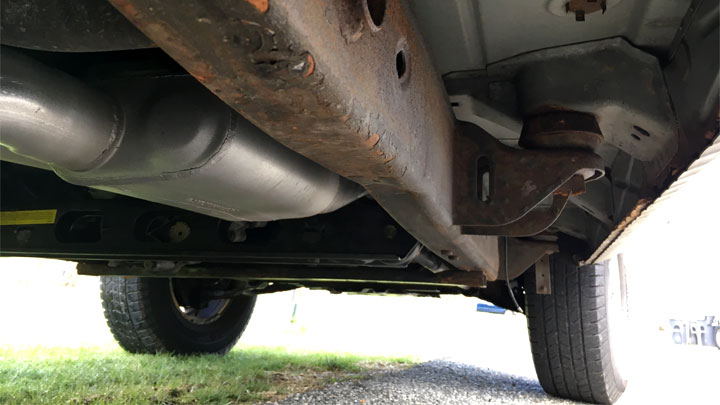Last Updated on January 21, 2022
It only takes a few minutes of navigating through a relentless rainstorm to understand the true importance of a vehicle’s windshield wipers. When operating as anticipated, a vehicle’s wipers whisk away moisture, thereby preventing a driver’s view from being obstructed during even the heaviest of downpours.
In truth, proper windshield wiper operation is as much a matter of safety, as it is a convenience. A clean windshield provides a driver with the best possible chance of avoiding collisions, along with other potential mishaps encountered during their commute.
Nonetheless, a vehicle’s windshield wipers can malfunction on occasion, presenting a somewhat troubling situation. Of these potential malfunctions, few are as common as which is encountered when a vehicle’s wipers are stuck in the “up” position, or stop halfway through their sweep. Issues of this type are not only annoying but are mildly distracting as well.
Read on to learn more about what causes a vehicle’s wipers to fail to return to the rest or park position.
Read Also: Squeaky Windshield Wipers? (4 Causes and How to Fix)
Why Your Wipers Stop In the Wrong Position
A vehicle’s wipers can fail to return to the rest position for a number of reasons. Understanding each of the potential causes of such an issue will assist you in remedying the problem at hand, thereby saving you time and effort along the way.
The following are several of the most common reasons that a vehicle’s wipers fail to return to the rest position.
#1 – Obstruction Within Wiper Sweep
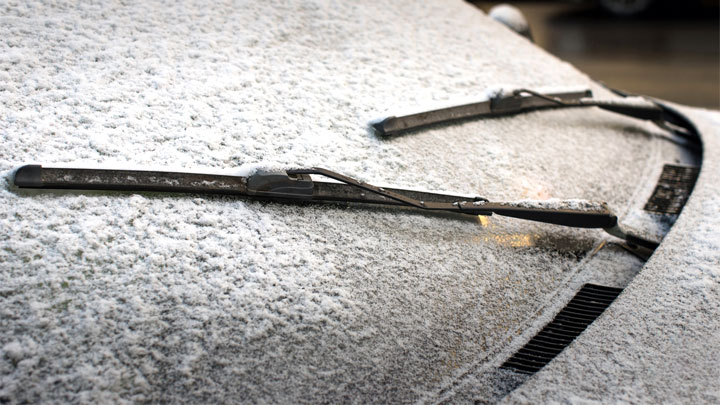
In certain cases, one or both of a vehicle’s wiper arms can become bound up along their standard sweep. This most commonly occurs when a windshield becomes coated in ice, snow, or sleet.
In such instances, the wiper arm in question catches upon this obstruction, thereby preventing it from continuing its sweep. As such, the rest or park position is not reached.
How to Fix
Issues of this type are remedied by clearing a windshield of the underlying obstruction. This typically involves scraping ice from a vehicle’s windshield, in order to free the bound-up wiper arm.
Read Also: Best Car Covers for Hail, Ice, and Snow
#2 – Weak Wiper Motor
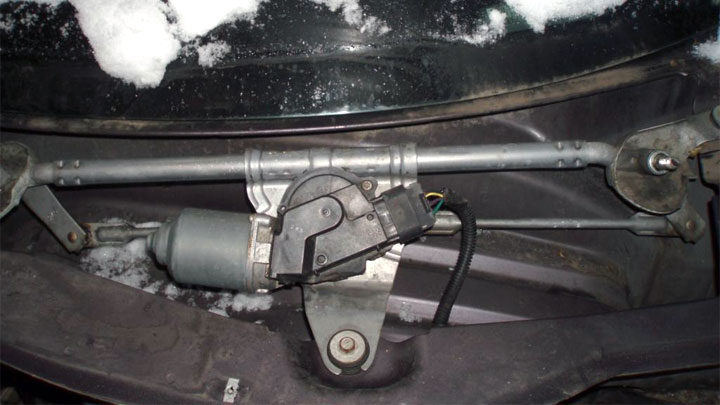
Much like any motor, a vehicle’s wiper motor can begin to wear with age. When this occurs, a motor often weakens to the point that it fails to cycle when minimal resistance is encountered. This is most easily observed while operating a vehicle’s wipers on a dry, or semi-dry windshield.
Under such circumstances, a vehicle’s wipers often drag or operate in a sluggish fashion. In severe cases, this can even occur in conjunction with a wet windshield, often preventing a vehicle’s wipers from completing their full cycle.
How to Fix
When a vehicle’s wiper motor begins to weaken with age, replacement becomes inevitable. In certain cases, this might also necessitate wiper transmission replacement. However, this is highly dependent upon the exact design of a vehicle’s wiper/transmission arrangement.
#3 – Damage or Binding Wiper Transmission
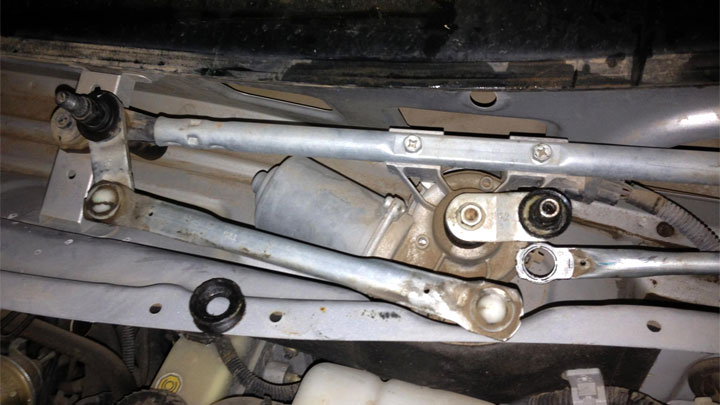
A vehicle’s wiper transmission relays the accompanying motor’s rotational output to the unit’s corresponding wiper arms, via a series of linkages. This, in turn, causes both of a vehicle’s wiper arms to sweep as intended, while also synchronizing the movements of both wiper arms to one another.
However, this linkage can wear and bind with age, causing the wiper transmission to stick in one position.
How to Fix
A damaged or excessively worn wiper transmission generally warrants replacement. In certain cases, it might be most sensible to replace the system’s wiper motor as well. However, other situations necessitate such replacement, due to the integrated design of each component.
#4 – Incorrectly Installed Wiper Arms
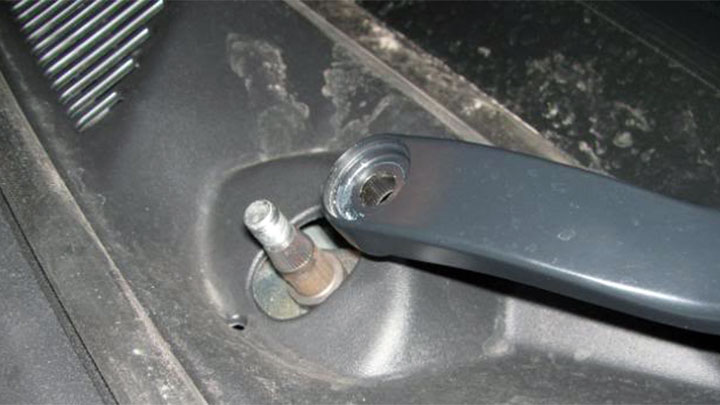
If you have recently replaced your vehicle’s wiper motor/transmission, only to find that your wipers no longer return to the park position, then wiper misalignment might be to blame.
It is entirely possible to reinstall your wiper arms at the incorrect angle, when completing such repairs. In turn, your wipers no longer stop at the bottom of your windshield, upon reaching the wiper motor’s “park” position.
How to Fix
This condition can be easily remedied by completing the reset procedure outlined below. The procedure itself takes mere minutes to complete, and can be facilitated through the use of basic hand tools.
Is It Possible to “Reset” the Wiper Park Position?
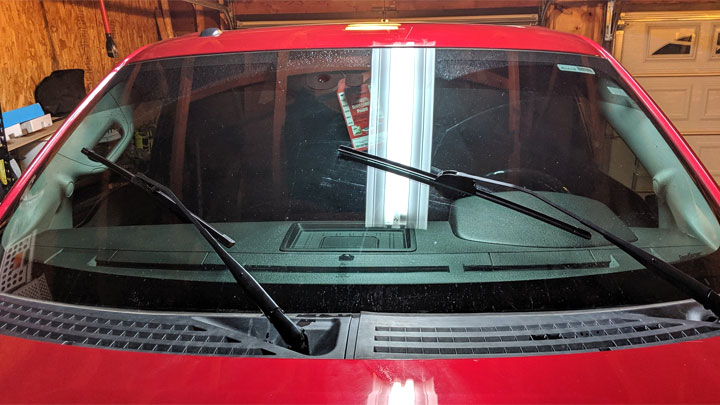
When necessary, it is indeed possible to manually reset the “park” position of a vehicle’s windshield wipers.
Doing so involves repositioning each wiper to the desired position when the wiper motor/transmission itself is at rest. This is accomplished by removing the wiper arms at their point of attachment with the wiper transmission.
The following steps can be followed to assist in resetting the park position of a vehicle’s wipers. As always, it is also a good idea to consult factory specific service literature for your particular vehicle before completing any procedure of this type.
#1 – Determine How Your Vehicle’s Wiper Arms Attach
The vast majority of vehicle wiper arms attach in one of two ways.
- The first of which involves the use of a specialty-nut, and conical-style mount. In this arrangement, a vehicle’s wiper arms are press-fit into place, as an acorn-nut, or lock-nut is securely tightened.
- The other common style of wiper arm features a locking tab, which must be pried outward before removal can occur.
#2 – Remove Both Wiper Arms
Remove both of your vehicle’s wiper arms, using the correct procedure according to that which was outlined in step #1. Set both wiper arms aside, once removed.
#3 – Cycle Wiper Motor
Turn your vehicle’s wipers to the “on” position, while ensuring that the wiper transmission itself cycles as intended. Next, turn your wipers off, and wait for all movement of the wiper transmission to cease.
#4 – Reinstall Wiper Arms In Park Position
Now, reinstall your vehicle’s wiper arms, while ensuring that they are positioned as close to their natural rest or park position as possible. Make sure that both wiper arms are secured in place.
#5 – Test To Ensure Proper Operation
You will now once again cycle your vehicle’s wipers. Watch carefully to ensure that neither wiper binds, sticks, or makes contact with one another. Likewise, it is important to verify that each wiper returns to the rest position as desired.
See Also: How to Remove Scratches on Your Windshield
Is It Safe to Drive With Stuck Windshield Wipers?
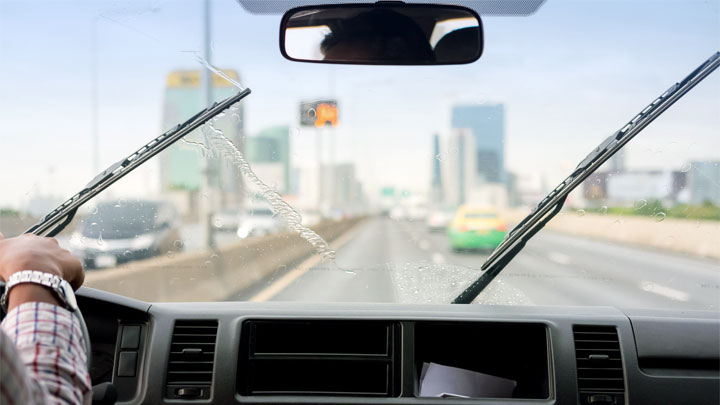
It is never considered “safe” to drive with malfunctioning windshield wipers. As mentioned above, a vehicle’s windshield wipers are designed to enhance driver safety, by providing the utmost visibility, even when weather conditions are less than optimal.
Properly operating wipers skim rainwater from a vehicle’s windshield, thereby eliminating unnecessary distractions.
A windshield wiper malfunction could easily force you from the road, in the event of heavy rainfall. Worse yet, attempting to drive in a heavy downpour, without the use of a vehicle’s wipers, can easily lead to a collision. This, in turn, presents a substantial risk of injury, or even death.
In any event, one should thoroughly diagnose and repair any issue related to a lack of proper windshield wiper operation, at the first available opportunity. This includes any issue that prevents a vehicle’s wipers from returning to the rest or park position.
If you do not feel comfortable tackling such repairs yourself, make an appointment with a trusted service center as soon as possible.



